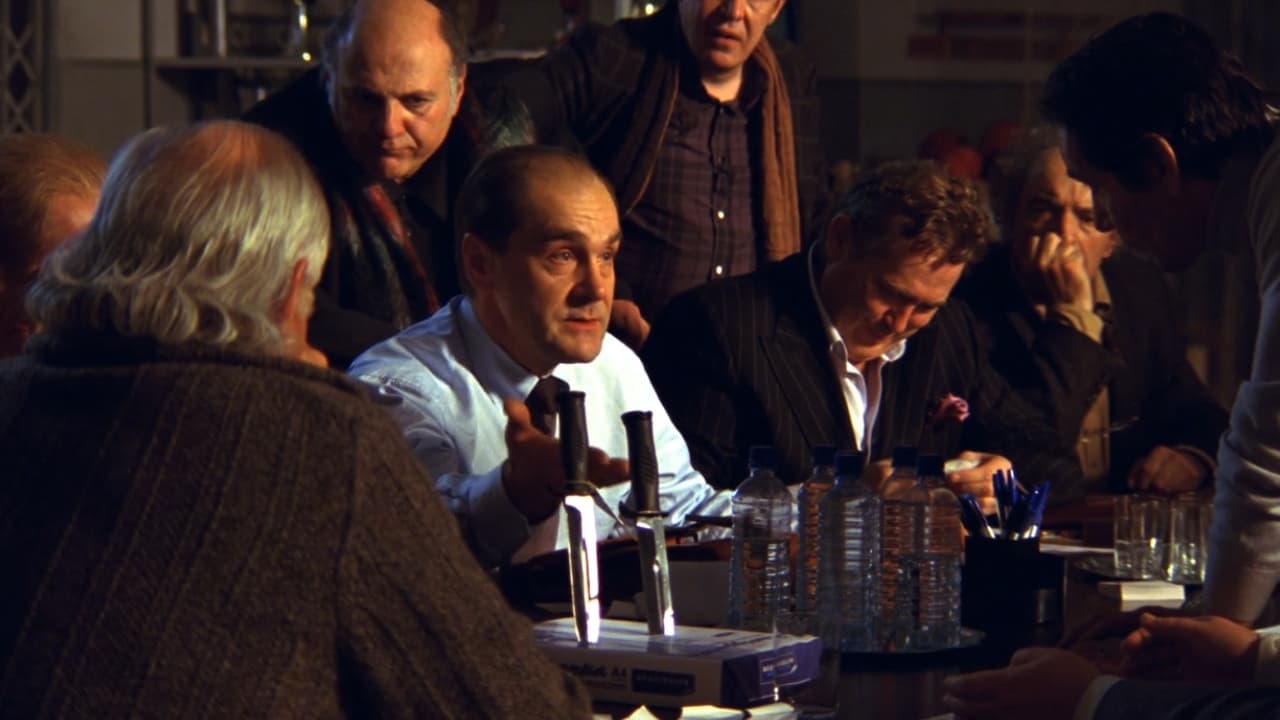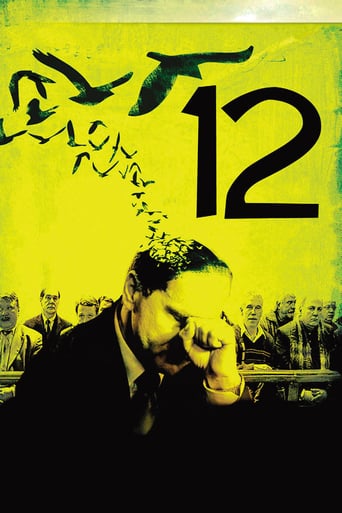



What a beautiful movie!
Highly Overrated But Still Good
Excellent characters with emotional depth. My wife, daughter and granddaughter all enjoyed it...and me, too! Very good movie! You won't be disappointed.
View MoreA film of deceptively outspoken contemporary relevance, this is cinema at its most alert, alarming and alive.
View MoreI encountered "12" by accident, and I'm glad I did. I've been into Russian and Soviet films for a very long time; all a part of being a Russophile! In the winter I wear a Red Army issued ushanka, my wrist watch is a Soviet Air Force Sturmanskie, I often have a KGB hip flask in the inside pocket of my motorcycle jacket, and the bike itself is a Russian Ural! From the little I've learned about the ex-Soviet Union and it's military, I gathered enough to get the shocking FULL IMPACT of the ending's meaning.I won't spoil things here... but after seeing the film, look up the Army's SPETZNAZ units, and learn a little about how they're trained and how they operate.After you know that... YOU'LL get the punch line here too."Uncle" isn't what he seems to be...
View MoreI really like the storyline. However it could be just me because I don't speak Russian but i thought half of the Jurors were over acting. Like i said, i watched it with English subtitles and i know translating a language could lose some of the 'gist' of what people are actually saying or meaning. To me, apart from the constant 'laughter and joke' majority of the jurors lacked emotion; or what they were saying didn't make sense with there actions. e.g: when each told there own story. There emotions didn't 'fit' with what they were saying or when one got hot headed it seemed it was over nothing. I do blame the translation. Overall I really enjoyed the whole storyline and the way it all headed. Although i must admit the 'near' ending shocked me. Thank God they made the decision that they did!
View More"12" is two title-words shorter and a full sixty-three minutes longer than "Twelve Angry Men," the 1957 Sydney Lumet classic on which this turgid Russian drama is based. Despite the obvious language difference, the Nikita Mikhalkov/Alexandr Novotosky/Vladimir Moiseyenko screenplay follows the Reginald Rose original - which began life as a "Studio One" teleplay in 1954 - fairly closely in form and outline. Again, eleven members of a jury stand ready to convict a young man of first-degree murder (in this case, for killing his foster father, an officer in the Russian army, for money) - until, that is, the lone holdout is able to sow enough doubt in the other jurors' minds to eventually get them to vote his way. And while in the original film the suspect faced racism and xenophobia on account of his being Hispanic, the suspect here suffers a similar fate for being Chechnyan.In the central role of the original dissenter, Sergei Makovetsky lacks the easily recognizable charm and charisma of Henry Fonda - and while this may make him a bit more believable as an "everyman" figure, it also makes him a less compelling focal point for a drama that takes far too long to play itself out. The extended length results, primarily, from the inclusion of brief flashbacks to the defendant's past, recounting the lead-up to the crime and the crime itself, as well as from individual speeches that drone on long past the point where any point can still be made. Each of the twelve jurors gets his moment in the spotlight to ham it up and declaim wildly on his theories about the case, his hatred of one ethnic group or another (in addition to anti-Chechnya sentiment, there's a great deal of anti-Semitism floating around the room as well), and the deplorable state of life in Russia - till the point where we no longer care about these people or the decision they're being forced to make. Eventually, we just want to get out of that place as badly as the men who are trapped inside it. And not all the talk about the Russian soul, not all the discussions of national politics or personal spleen-venting on the part of the participants can make us care one iota about the drama that's unfolding.The question one must finally ask when watching "12" is why anyone would want to take a work like "Twelve Angry Men," celebrated for its brevity and dramatic precision, and turn it into a lumbering, ponderous, elephantine bore - replete with endless speechifying and scenery-chewing performances. Why indeed!
View MoreIn Mikhalkov's preposterously overblown remake of Sydney Lumet's Fifties jury deliberation drama 'Twelve Angry Men,' a Chechan teenager (Apti Magamaev) is on trial for the murder of his adoptive Russian father. To begin with, as in the Fifties movie, one man initiates a long complicated process of reevaluation by voting "not guilty" when everyone was prepared to send the boy off to life imprisonment and go quickly on their way. In the original he was Henry Fonda, whose air of probity was impeccable. This time he's a successful inventor with a lurid alcoholic past (Sergey Makovetsky) and he sets no standard of probity. Though "reasonable doubt" is mentioned (one of the jurors has studied at Harvard and has the phrase in his head), the dissident vote has no logical or specific basis. He just sort of thinks it was a good idea to vote the other way.Forget what happened in court; the meaning of the case; the analysis of the evidence presented. '12' focuses on the lives, the traumas and prejudices of the participants; the turmoils of a nation--and finally, most peculiarly, on what's best for the accused, be he innocent or guilty.'12' is elaborate, illogical, and absurd. In terms of jury deliberation it is absolutely ridiculous. But it puts on a great show.We are somewhere around Moscow. The twelve worn out, middle-aged men are locked by the bailiff in a school gym. And this is emblematic of the film's style. The men may be locked in, but they have a lot of room to play around in. No mere solemn deliberations around a long table for them--though there is a long table, and they do intermittently sit at it, these heavy-set, darkly garbed men, with a cluster of plastic water bottles in front of them.Never for very long, though. In the course of the drama the twelve jurors throw a ball at a basketball net and a hypodermic at a dart board, or lift weights or play a piano. They restage the crime in a mockup of two matching apartments. They throw knives, and to prove a point, one threatens to stab another. They wander around, smoke, send off alarms, throw up, rage, sob. Mikhalkov is shamelessly prepared to do absolutely anything to keep this from being just a lot of talk. Hence the gym and all its accouterments, which include a giant disco reflector ball, an auxiliary lighting system, moments of total darkness, candlelight and spotlights, a large decaying heating pipe, and a wheelchair. And, the corniest possible symbol of confinement--a lone sparrow. And a series of independent "arias" when one juror or another gets up and does a long dramatic monologue about himself.But that isn't enough. In the middle, there is a giant explosion, and there begin a series of flashbacks to the Chechan war, with fires and bombs and a dog running past the camera with a severed hand in its mouth. There are also many images of the accused as a boy, cowering among the rubble, or as a prisoner, dancing around in his cell in a down coat to keep warm.Nonetheless '12's so successfully full of itself that it makes its over two and a half hours go by before you know it--despite a lot of wasted time and sloppy excess. Through the jurors' wild digressive monologues Mikhalkov and his co-writers Vladimir Moiseenko and Alexander Novototsky-Vlasov almost succeed in redefining what deliberations are about. But ultimately they are simply distracting us from the fact that he's only using the deliberations as a hook on which to hang all his thoughts about Russia's modern journey and the meaning of life.The deliberations, therefore, aren't about the case. They're about the jurors (this figures in Lumet's film too, but more quietly). A belligerent bigot cab driver (Sergey Garmash) calls Chechans "savages" and assumes the boy is guilty. He attacks the elderly Jewish intellectual (Valentin Gaft) who's the second to switch his vote to "not guilty." He intimidates the Harvard man, a TV producer and a caricature (Yuri Stoyanov) into a fit of nausea and paranoia that leads him to change his vote back to "guilty." And later a reenactment awakens such painful contrition over his own violence as a father that he switches, late in the game, to "not guilty" himself.A surgeon (Sergey Gazarov) sympathizes with the boy because of his Caucasian origins. A self-made man with sympathies for the underdog, he rejects the cabbie's bigotry early on. He also does a carnival turn showing off his back-home skill at knife-twirling. The director himself plays the jury foreman, who has his own surprise twist toward the end to disrupt things after it seems unanimity has been achieved at last.What are we to make of all this? It must be seen more as an epic, operatic riff on the theme of Twelve Angry Men than a contemporary Russian re-imagining of its original concept. The concept of the law is remote from ours. In fact there is an epigraph to the effect that though the law is steadfast, mercy may take precedence over it. And there is no doubt about the reasonableness (amid all that is surreal here) of such concepts coming to mind when jurors must deliberate in a murder trial.I lost tract of the reasons why various jurors changed their minds. When one did, usually somebody else followed suit. It was to be expected. One forgot to ask why. And in the end, '12' violates our essential notions of what a jury trial is about: that it has to do with arriving at a fair and accurate decision about a specific case. This can't possibly be called a good movie. But it's too vivid, entertaining, and rich in ideas to dismiss out of hand. As an artifact of contemporary Russia it is a mine of information--though all to be taken with a grain of salt.
View More